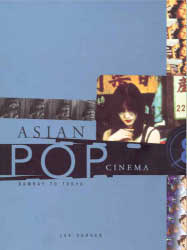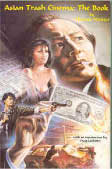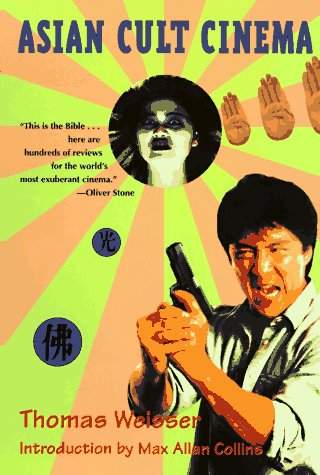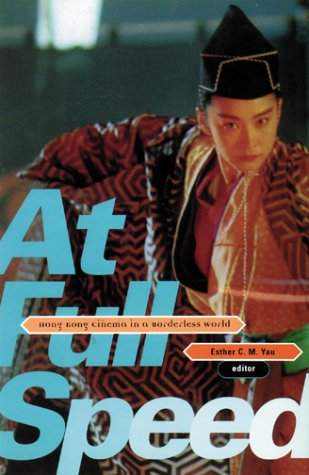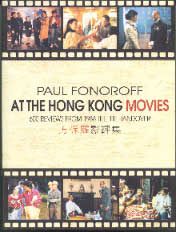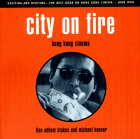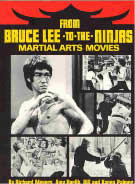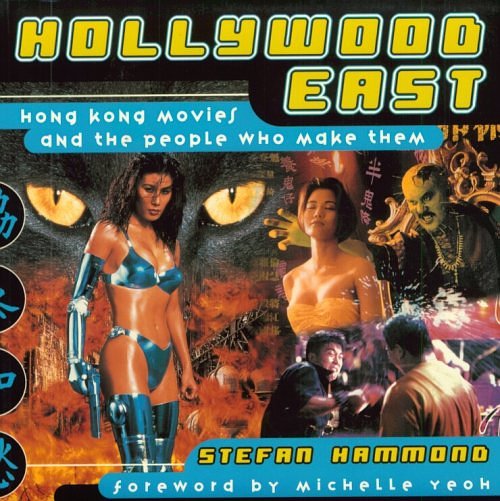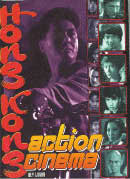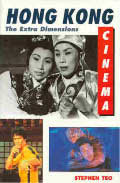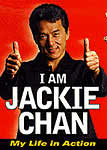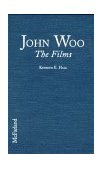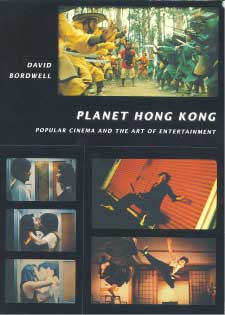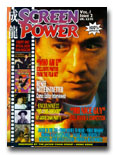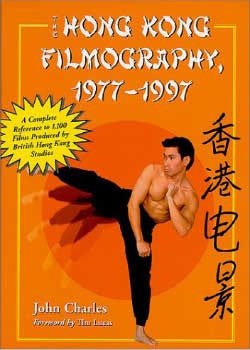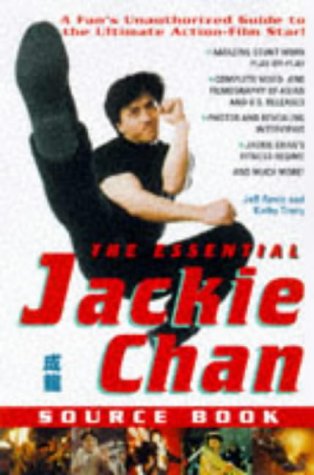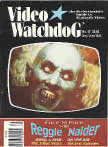Asian Cult CinemaEdited by Thomas WeisserThis magazine used to be called Asian Trash Cinema, which is a bit ironic, since it has actually become more "trashy" lately. Though there is some HK content in here (mostly people whining how the new movies coming out aren't any good), most of the magazine's content is devoted to Japanese "pink" films. Several of the magazine's writers (including Weisser himself) seem to have an unhealthy obsession with these films, which often feature graphic depictions of rape and S&M. I really don't care about one's sexual preferences, but reading about 40-year-old guys getting off on seeing young Japanese girls tied up and beaten is, well, a bit creepy to say the least. The magazine is also full of pornographic images, including one on the back cover of every issue. Avoid this magazine, if for nothing else that Weisser can't edit worth a damn. Each issue is full of spelling, grammatical, as well as factual errors (such as saying that Martial Law was on FOX, not CBS). There's also annoying (and often inaccurate) overuse of bold and italic type. |
|
Asian Pop Cinema: From Bombay to TokyoWritten by Lee ServerServer sets out to do quite an ambitious task -- give a brief history of Asian cinema, not just Japanese or Hong Kong, but even lesser-known (at least to most Westerners) industries such as Thai and Indian. As such, none of the sections goes into very much detail. The Hong Kong section in particular is very brief and won't provide much information for people who are well-versed in HK cinema, but there is a good interview with John Woo. The book looks very nice with lots of glossy color pictures, though for the price, one might expect more actual content. |
|
|
|
Asian Trash Cinema: The Book (re-released as Asian Cult Cinema)Written by Thomas WeisserA collection of mini-reviews from Asian Trash Cinema magazine. The book offers some handy cast/crew listings and filmographies, but the reviews themselves are so full of inaccuracies that one has to wonder if Weisser actually watched all of the movies he reviewed. For instance, in the review for A Better Tomorrow 2, Weisser states that Ken Gor is Mark Gor's "twin cousin" (if you have never seen the film, Ken is Mark's twin brother -- who ever heard of a twin cousin?). This kind of thing might be forgivable on a lesser-known film, but really, ABT2 is one of the most famous HK films and getting such a simple fact wrong makes the whole book look amateurish -- something that is not helped by the book's numerous spelling and grammatical errors. Weisser's love of video nasties is also present; he'll rip on Wong Jing movies for being stupid but then gush over anything with rape, S&M and/or a women's prison in it. As such, the ratings themselves become somewhat suspect because you wonder if Weisser is rating the films on their exploitation factor rather than the actual content and craftsmanship. Like Fonoroff's At the Hong Kong Movies, this book is really only useful as a reference if you don't have reliable net access. Even then, I might skip it, since the book is several years old, which means some of the recent movements in HK cinema, such as the Triad Boyz or the "new" New Wave are left out completely. |
At Full Speed: Cinema in a Borderless WorldEdited by Esther C.M. YauThis is a collection of essays by various film scholars, such as "Planet Hong Kong" author David Bordwell and "Hong Kong Cinema: The Extra Dimensions" writer Stephen Teo. The works take on a wide range of subjects, from the more common discussions of the technical and commercial practices in Hong Kong, to more metaphorical dissertations on themes such as dislocation. Even though the essays for the most part are well-written, the use of film jargon may be off-putting to some -- this is definitely not a "light read" by any means. However, even if you are not a die-hard HK film buff or film student, you will probably still get some enjoyment out of the pictures in the book, most of which are rare lobby cards, and some use of a helpful appendix which lists stars and films in English and Chinese. |
|
At the Hong Kong Movies: 600 Reviews From 1988 to the TakeoverWritten by Paul FonoroffPaul Fonoroff is a film critic for The South China Morning Post and supposedly one of the world's experts on HK cinema, so it begs to ask, why does he hate the movies so much? Out of the 600 reviews, I would say about 10% are actually positive. Now it's true that there are a lot of bad movies produced in HK (just like all over the world), and Fonoroff certainly can disagree with widely-held views such as The Killer is a great movie. However, there seems to be a lot of cultural elitism in the book, which makes it hard to read through at times. In Fonoroff's defense, most HK-based film critics are much the same as him, concentrating on the moral message rather than the movie itself -- no wonder HK films usually do bad on their home turf.On the plus side, each review is accompanied by a handy cast and crew list, but, really, when such information is available for free over the net, I see little reason to buy this book except as a reference for those times when you can't get net access. |
|
City on Fire: Hong Kong CinemaWritten by Lisa Oldham Stokes and Michael HooverUnlike many HK film books, City on Fire takes a scholarly (rather than a fan's) point of view. The main push of the book is that it correlates certain historical events (such as the 1997 takeover) to the particular mood of the films produced at the time. For instance, it covers the use of the hospital and babies as symbolism for the "new" Hong Kong in John Woo's Hard-Boiled. It also does a nice job of explaining some Chinese social, economic and spiritual beliefs and how the relate to each other in films. The only bit I really didn't care for was the constant quoting of Karl Marx. The quotes felt like a stretch (I highly doubt John Woo had Communist ideals in mind when creating his films) and got tiresome after a while. Still, City on Fire is a well-written and interesting book. While it may be a bit too advanced for newbies (the book supposes at least some prior knowledge of HK history and films), it's still worth your time. |
|
From Bruce Lee to the Ninjas: Martial Arts MoviesWritten by Richard Meyers, Amy Harlib, Bill & Karen PalmerThis was one of the first "mainstream" film books (i.e., something available to the general public) that talked about Hong Kong movies. Of course, as the book is now over 15 years old, some of the information is a bit out of date and inaccurate, but overall this is a nice beginning point for those who want to know a bit more about the genre. It never goes into any great depth, but it's a good read, and the book's many pictures will help you identify some old-school stars. |
|
Hollywood East: Hong Kong Movies and the People Who Make ThemWritten by Stefan HammondThis is Hammond's second book about Hong Kong movies, after Sex and Zen & A Bullet in the Head. The layout is pretty basic, with each chapter concentrating on a particular star or genre. Like Hammond's first book, it won't make you an expert on the subject, but the entertaining writing style and interesting factoids make for a good read. Of particular note is a chapter giving a "guided tour" of Hong Kong for film buffs, and a section in each chapter dedicated to "hex errors" (bad subtitles) for that genre. |
|
Hong Kong Action CinemaWritten by Bey LoganAs the title suggests, Logan's book looks at HK action films, from the Wong Fei-Hung series of the '30's to modern action stars like Jackie Chan and Sammo Hung. While it's not that "scholarly" and there are a few factual errors here and there (such as stating the first pairing of Chow Yun-Fat and Danny Lee was in City on Fire, when actually it was the horrid The Executor), this is an excellent book for newbies. There's lots of pictures and a good overall view of HK action films. Even long-time HK fans will probably find a few new facts in here, particularly with the sections that deal with old-school kung fu stars and female action stars. However, some of Logan's "best of" lists are a bit questionable -- Tragic Hero as one of the ten best heroic bloodshed movies? I agree that the ending shootout with Chow-Yun Fat wielding dual rocket launchers is cool, but the rest of the film is an utter bore. Also, Logan tends to kiss Donnie Yen's (who he worked with on a couple of films) ass a bit much. It's still a good read, though. In response to my comments about the "ass-kissing" (something which also gets brought up frequently in the alt.asian-movies newsgroup) Logan sent me a couple of e-mails. Here's his side of the story (my comments are in [brackets]): "Actually, as those who know me will attest, I've always been more of a butt-kicker than kisser. Maybe I should have taken a tougher line with Donnie on some of his excesses [there have long been rumors that Yen has a cocaine addiction and is generally difficult to work with even when sober], but, when I came to Hong Kong, he was a major star and I was a nobody, and I didn't want to piss him off! Then, three years later, I was an executive at Media Asia and he was a nobody, and you don't want to kick a man when he's down." "Like you, I hope DY makes the most of this fresh crack of the whip [his chance to work overseas in movies such as Highlander:Endgame]. Now I'm an older and more mature friend, hopefully I can, should occasion allow, advise him better. I seldom take a fence when there's a door available. You're right that, in retrospect, I did give Donnie a relatively easy ride in the book [compared with Conan Lee, who had an equally rocky ride in the HK movie industry after being touted as "the next big action star" as Yen was]. He [Yen] was, and is, my friend, and if I erred on the side of loyalty, so be it." "However, he hadn't really hit the skids until it had already gone to press. I still can't believe the quality product he turned down to star in dreck. He was supposed to play the Ken Lo role in 'Drunken Master II', the Chin Siu-ho role in 'Tai Chi Master', he fell out with Yuen Woo-ping over 'Wing Chun', he gave the deposit money back to Wong Jing rather than make any more films for him... Even so, whatever Donnie's shortcomings, he's no Conan Lee!" |
|
Hong Kong Cinema: The Extra DimensionsWritten by Stephen TeoThis is definitely not a book for newbies. In fact, I would say that unless you are a very serious HK film fan, a history buff or a film student, you should probably avoid this book. It's very densely (but well) written with no pictures. All that being said, if you are tired of the "fanboy" attitude found in most other HK film books and want a very in-depth look at the HK movie industry and how the films relate to the history and culture, you should check this book out. |
|
I Am Jackie Chan: My Life in ActionWritten by Jackie Chan with Jeff YangChan's autobiography; it concentrates mostly on his early years before the success of Police Story. Though it was most likely written almost totally by Yang (since Chan himself has admitted that he was functionally illiterate for most of his life), it's still quite a fascinating work, particularly when Chan talks about his years in the Peking Opera School or fending off the Triads after he broke out of his contract with director Lo Wei. It also has a complete (though sometimes inaccurate) filmography, a list of injuries Chan has incurred and Chan's favorite movies, fights and stunts. Highly recommended for Jackie Chan fans or those wanting to know what Chan and other stars such as Sammo Hung had to go through to get into the HK movie industry. |
|
Jackie ChanWritten by Wade MajorWith Chan's rising popularity in the States, there have been several unauthorized biographies to come out about him. This book isn't as bad as some of the straight-to-paperback trash that's out there, but it isn't exactly great either. At only 96 pages, most of which are covered with uninteresting photos (the usual film stills, publicity shots, etc.), this book feels more like a term paper rather than a serious study of Chan's life and body of work. It's basically the same stuff that other people have written about regurgitated over again, such as Chan's early years in opera school and his failures to break into the West. Major offers no new insights into his subject, and his obvious fondness for Chan's work paints over some of the seedier -- but perhaps more interesting -- aspects of Chan's life, like his womanizing and gambling during his earlier years. Unless you're just looking for a book to pad out your own term paper, stick with Chan's autobiography instead. |
|
John Woo: The FilmsWritten by Kenneth HallAn in-depth look at Woo's movies (up until Face/Off) that goes into great detail about his influences from both eastern and western film-makers. Frankly, even though I enjoyed the book, it's probably too wordy and dense for your average reader, but if you're a serious movie fan with a taste for historical tidbits and references, you'll get a good deal of information from this tome. |
|
Planet Hong Kong: Popular Cinema and the Art of EntertainmentWritten by David BordwellBordwell (as he admits in this book's introduction) is no Hong Kong film "expert," but he is a renowned film professor and has written many other books. Chances are if you've had any kind of film history class, you've read one of his books, and Planet Hong Kong fits right in. It would be perfect for a college-level Hong Kong film history class. I'm not saying that the casual Hong Kong film fan won't appreciate the book, but serious Hong Kong (or just general) film fans will definitely get more out of this book, especially when Bordwell goes into the technical and business aspects of the Hong Kong movie industry. My only real complaint about the book is its' price. While it is thick and has plenty of pictures, $60 is a lot to spend on a book unless you are a serious Hong Kong film fan or film student searching for a good overall textbook on the industry. |
|
Screen PowerEdited by Richard CooperThis is a publication of the official Jackie Chan fan club, so if you're expecting hard-hitting journalism or unbiased reviews, look elsewhere. But the magazine does offer some nice (if a bit "fluffy") behind-the-scenes information and pictures about Jackie Chan's latest projects, and there are occasionally some good interviews with various people who have been involved with Chan's movies. My main problem with this magazine is its' price. Even though it is fairly large with glossy paper and many color pictures, I really can't justify someone spending $8 on a 40-page magazine unless they are a die-hard (and I mean die-hard) Jackie Chan fan who just can't get enough of him. |
|
The Hong Kong Filmography 1977-1997Written by John CharlesTake all the other capsule review books like Asian Cult Cinema and At the Hong Kong Movies, pump them up with steroids and add a genuine love for the industry and a thorough knowledge and you would get this book. It is extremely expensive ($75), but if you're serious about Hong Kong movies, it's worth it. New fans will find over 1,000 reviews done with a critical eye, which sets it apart from most of the other review books like ACC, which seem extremely biased towards certain genres, actors or directors. Those more well-versed will find interesting information about the movies (where certain movies stole their soundtracks from, a bit of history about the actors involved, etc.) and, most importantly, comprehensive cast lists -- something which even the larger internet database sites fail to do consistently. Finally, your questions of "who the hell's that guy?" will be answered. Don't let the cheesy cover fool you -- this is one of the best Hong Kong film books out there. |
|
The Essential Jackie Chan SourcebookWritten by Jeff Rovin and Kathy TracyThis is a refreshing change of pace from a lot of the junky Jackie Chan books out there. The book is a bit dated; it came out just after Mr. Nice Guy, and so doesn't include Chan's rise to popularity in the US with films like Rush Hour. Also, some of the parts where it talks about getting movies on laserdisc are of course pretty much obsolete, with the availabilty of DVD. But most of the information in here is solid, informative and readable, from a biography to a breakdown of Jackie's injuries to even listing the charities Jackie works for. Of particular note is the filmography the authors have compiled, which goes so far as to list all of the alternate names in both English and Chinese, and even lists the obscure stuff Jackie had bit parts in or was spliced into. The book also provides some nice info for other actors such as Michelle Yeoh that have appeared in Chan's movies. While most die-hard Jackie fans already know the stuff contained in here, it's a good read for both newbies and vets alike. |
|
Video WatchdogEdited by Tim LucasThis is a magazine that specializes in cult films, most notably US sci-fi and European horror. But there is also a decent amount of space dedicated to HK films; one recent issue had reviews of about ten HK films. One nice thing about Video Watchdog is that they not only compare the different versions, but also the different mediums as well. So if you want to know how the US VHS version of Mr. Nice Guy differs from the HK VCD, this is the place to turn to. |
Thanks to View from the Brooklyn Bridge for providing some of the cover images

